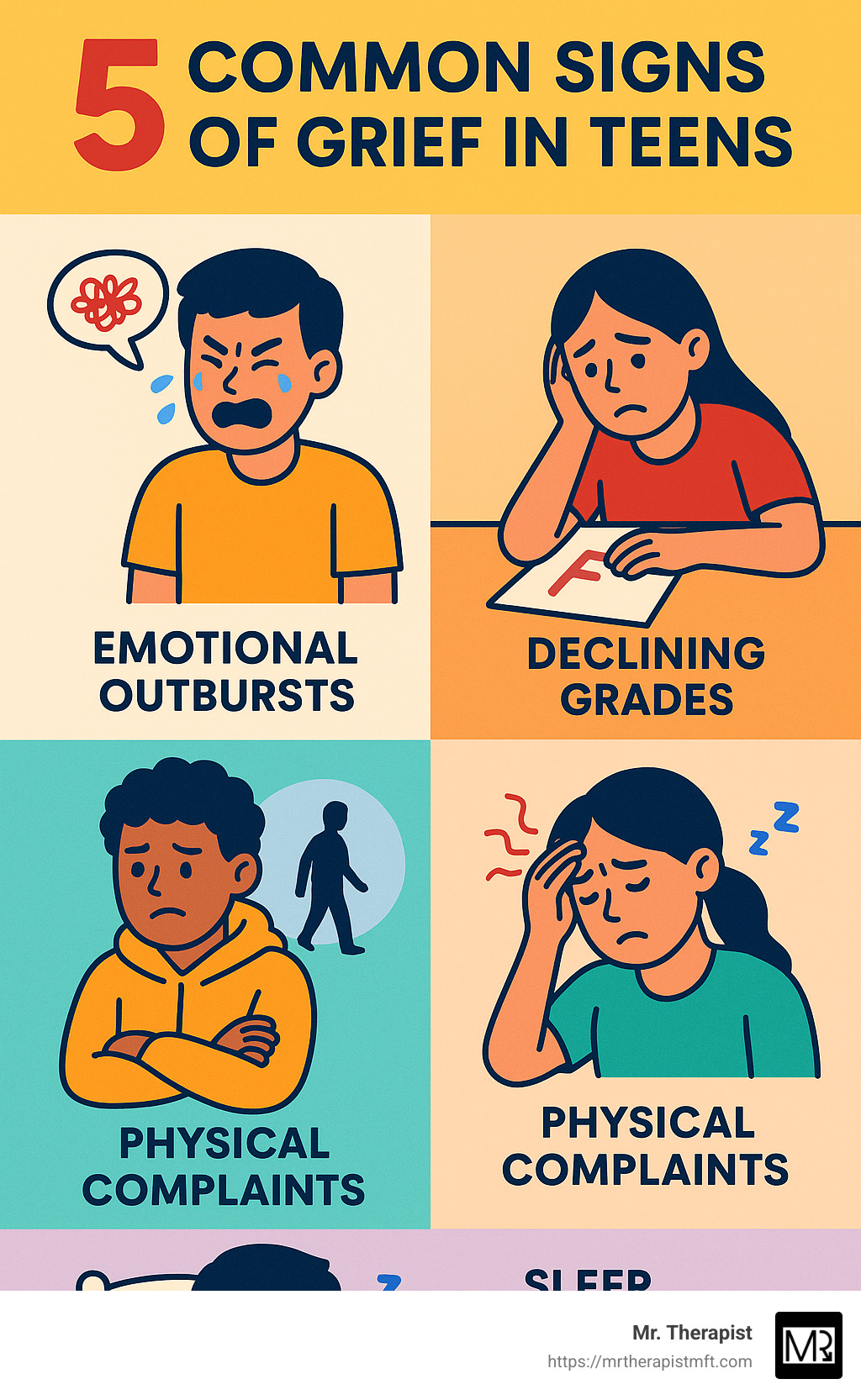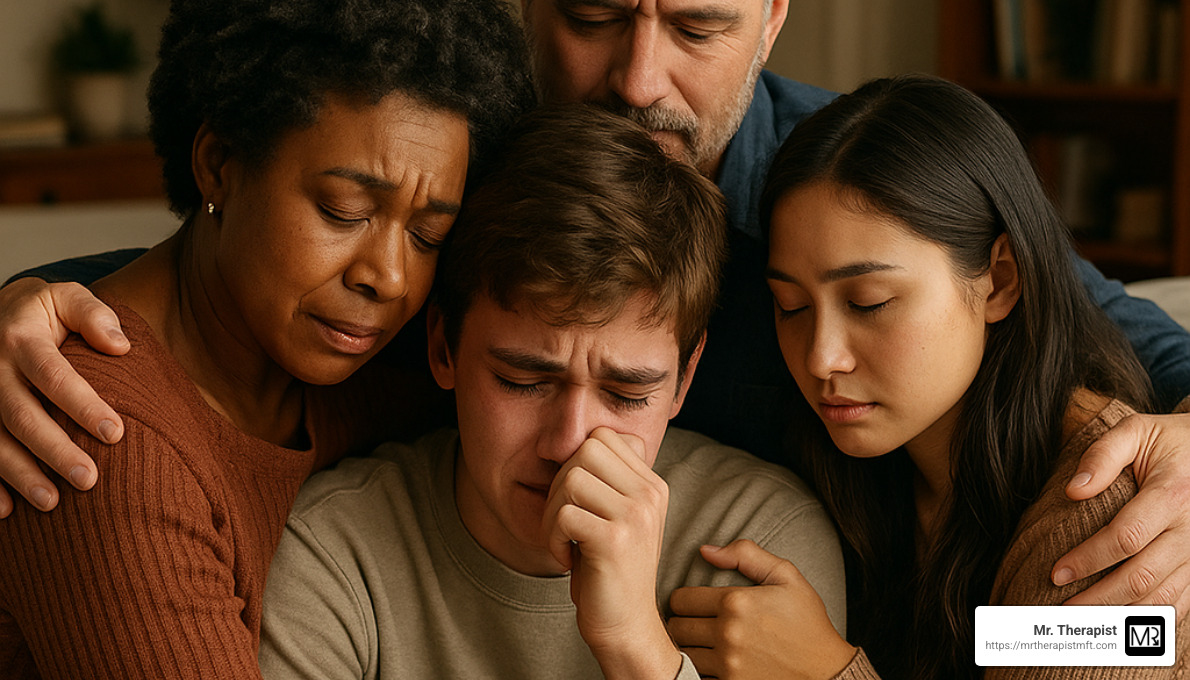
Understanding the Journey Through Loss
Grief counseling for teens is a specialized approach to helping adolescents process and cope with loss in healthy ways. When teenagers experience the death of a loved one or another significant loss, they need support custom to their unique developmental stage.
Key aspects of grief counseling for teens:
* Professional guidance to steer complex emotions
* Age-appropriate coping strategies
* Safe space for emotional expression
* Support for both individual and group settings
* Help maintaining academic performance during grief
* Tools to prevent unhealthy coping behaviors
Grief is a universal experience, but teenagers process loss differently than adults or younger children. As the Dougy Center notes, “Grief is hard, but knowing you are not alone can help.” Adolescents face the already challenging task of identity formation while simultaneously dealing with overwhelming emotions that accompany loss.
Each year, thousands of teenagers experience the death of someone they love. Many are told to “be strong” or “carry on,” which can hinder their natural mourning process. Without proper support, teens may develop unhealthy coping mechanisms or experience long-term emotional difficulties.
The grief journey for teens is complex and deeply personal. As one 16-year-old shared, “I feel better knowing that there are other kids who feel the same way I do.” This highlights the power of connection in the healing process.
I’m Emmanuel Romero, a Licensed Marriage and Family Therapist with extensive experience providing grief counseling for teens through my work as a Mental Health Specialist in the Irvine Unified School District and in my private practice, where I’ve helped countless adolescents steer the complex emotions that accompany loss.

Understanding Teen Grief
Grief is a universal feature of human existence, but the way it manifests varies considerably across different age groups. For teenagers, grief takes on unique characteristics due to their developmental stage – caught between childhood and adulthood.
Adolescence is already marked by rapid physical, psychological, and academic changes. When grief enters this tumultuous landscape, it creates additional challenges that require specialized understanding and support.
How Teens Experience Grief Differently from Adults
Teenagers experience and process grief in ways that differ significantly from adults for several important reasons:
Developmental Differences
* Teens have a limited capacity to tolerate emotional pain compared to adults
* Their sense of identity is still forming, making loss particularly disruptive
* They’re simultaneously seeking independence while needing support
* Abstract thinking about mortality is still developing
Emotional Expression
* Teens may have limited ability to verbalize complex feelings about grief
* They often experience grief in waves or “grief bursts” rather than continuously
* Many teens mask their grief to avoid appearing different from peers
* Some use humor or seemingly inappropriate responses as coping mechanisms
As one teen expressed in research collected by the Dougy Center: “I hate it when people think I should be grieving according to the ‘stages’ described in some high-school health book. Since my sister’s death I’ve learned that grief isn’t five simple stages.”
This sentiment reflects a crucial understanding: teen grief rarely follows a predictable pattern. Their emotional responses may seem contradictory or confusing to adults. One parent shared this experience: “Expect the unexpected. Emily actually danced and sang after I told her that her mother died. I was shocked. Later I realized the relief we both felt. The relationship had been filled with her alcoholism, lies and illness.”
These unexpected reactions don’t indicate a lack of caring but rather demonstrate the complex ways teens process overwhelming emotions.
Common Stages of Grief in Teenagers
While grief doesn’t follow a linear path, understanding common emotional stages can help both teens and their support systems recognize normal grief responses. Elisabeth Kübler-Ross’s model provides a helpful framework, though teens may cycle through these stages repeatedly or experience several simultaneously.
Denial and Shock
* Initial numbness and disbelief
* “This can’t be happening”
* May appear emotionally detached
* Serves as a temporary protective mechanism
Anger
* Frustration at the unfairness of the loss
* May be directed at themselves, the deceased, or others
* Can manifest as irritability, outbursts, or rebellion
* Often masks deeper feelings of vulnerability
Bargaining
* Attempting to regain control through “what if” and “if only” thinking
* Making promises to change behavior in exchange for relief
* “If you’ll just let my mommy live, I’ll promise to do my homework every day”
* Searching for ways to reverse or understand the loss
Depression
* Profound sadness and withdrawal
* Loss of interest in previously enjoyable activities
* Physical symptoms like fatigue, sleep disturbances, or appetite changes
* Feeling overwhelmed by the reality of the loss
Acceptance
* Gradually adjusting to a new reality
* Finding ways to move forward while honoring the loss
* Not “getting over it” but learning to live with it
* May include moments of peace alongside ongoing sadness
As Gale (2002) wisely noted, “Grief is individual, and cannot be measured or judged by anyone else.” This is particularly true for adolescents, whose grief expressions may not align with adult expectations.
The Impact of Grief on Adolescents
Grief isn’t just a feeling—it seeps into every corner of a teen’s world. Recognizing these ripples is key to offering the right kind of support.
Emotional and Behavioral Reactions
The emotional ride for grieving teens can be a wild one. They often face overwhelming sadness, which can hit them in unexpected waves. Outbursts of intense anger or rage might seem disproportionate to those around them, but it’s all part of trying to make sense of their loss. Some teens feel a heavy guilt over things left unsaid or undone with the deceased, while others grapple with anxiety about further losses or even their own mortality. Emotional numbness often kicks in as a way to protect themselves, and though they might feel relief after a loved one’s long illness ends, this can be tangled with guilt.
Behaviorally, these emotions manifest in different ways. Teens might struggle with sleep disturbances—either insomnia or wanting to sleep all day—and their appetites can change, either not feeling hungry at all or turning to food for comfort. When it comes to focus, school can become a real challenge; difficulty concentrating makes decisions harder and can turn homework into a daunting task. Many choose to withdraw socially, pulling back from friends and usual activities. In some cases, they might engage in risk-taking behaviors like substance use or reckless driving, or even self-destructive actions such as self-harm or having suicidal thoughts. One teen poignantly shared, “I’m depressed because my brother killed himself. I’ve been through so much and don’t know what to do anymore.” This highlights how grief can lead to deep despair, especially when teens lack effective coping strategies or support.
Effects on Academic Performance and Social Relationships
Grief doesn’t just tug at the heart—it messes with life in key areas. In school, a grieving teen might see their grades slipping due to trouble concentrating and a lack of motivation. Memory problems can make test-taking a nightmare, and attendance might drop because of either physical symptoms of grief or plain old avoidance. Meeting deadlines or completing assignments can feel like climbing a mountain.
Socially, things can get complicated too. Teens might feel withdrawn from friends, as if they’re living in a different world. It’s hard to relate to peers who haven’t faced similar losses, and friendship circles might shift, depending on who can truly understand their pain. Some teens even find it tough to keep up with regular social activities. As one grieving teen put it, “Sometimes I just can’t relate to my friends anymore. They worry about such trivial things, and I’m dealing with this massive hole in my life.”
The pressure to maintain academic performance while grieving can be intense. School counselors often see students trying to keep up appearances, even as they feel overwhelmed inside. This is why grief counseling for teens is so vital—it’s about offering the right tools and support to steer these choppy waters, helping them find their way back to calmer seas.
Effective Grief Counseling for Teens
Grief counseling for teens is all about meeting them where they are, emotionally and developmentally. At Mr. Therapist, we have honed our strategies through both research and hands-on experience, ensuring that our approaches are as effective as they are compassionate.
Grief Counseling for Teens: Therapeutic Techniques
When it comes to helping teens steer the stormy seas of grief, a few therapeutic approaches stand out. Emotionally Focused Therapy (EFT) is one such gem. At Mr. Therapist, we love EFT because it sees emotions not as problems but as keys to healing. This method helps teens by creating a safe space where they can express their emotions, identify and name those often-confusing feelings, and develop healthy ways to regulate them. It’s all about changing emotions into sources of strength and building relationships that support healing. EFT is particularly fitting for teens since they naturally process emotions through connections and relationships.
Another star player in this area is Cognitive Behavioral Therapy (CBT). This approach helps teens tackle those pesky negative thought patterns that can make grief feel even heavier. By recognizing and reframing distorted thinking, teens can learn coping strategies, problem-solving skills, and ways to engage in life even as they grieve.
And let’s not forget about the power of creative interventions. Many teens find solace in expression through art, music, or writing. Whether through art therapy, music therapy, or journaling, these activities provide bridges to deeper conversations about loss.
Grief Counseling for Teens: The Role of School Counselors
School counselors are like the unsung heroes for grieving teens, especially since schools are a big chunk of their world. Counselors offer individual support by checking in with students and providing academic accommodations if needed. They also coordinate with teachers to ensure a supportive environment.
But it’s not just about one-on-one help. Group support programs like “Good Grief Clubs” offer a community where teens can connect with peers who understand their experience. These structured series provide educational support and a chance for teens to feel less alone. It’s incredibly helpful for students to see familiar faces from school in such programs, offering a sense of continuity and comfort.
At Mr. Therapist, we work hand-in-hand with school counselors to ensure teens have a safety net both at school and at home—a coordinated effort that prevents teens from slipping through the cracks during their grief journey.
The Importance of Peer Support Groups
Peer support groups are like a warm hug for grieving teens—a place where they can shed the feeling of isolation. These groups offer a unique mix of connection and understanding, allowing teens to feel normal in their grief. They can share experiences, offer support to others, and engage in authentic emotional expression.
As one teen put it: “It’s good to know that I’m not the only one feeling this way.” The relief in that realization is palpable. Effective groups are led by trained professionals and include activities that are age-appropriate and respectful. They balance grief work with typical teen socialization, and often include opportunities to remember and honor lost loved ones.
Many teens find these groups to be the first places they truly feel understood. With professional guidance and peer connections, these groups create a powerful and healing environment.
Supporting a Grieving Teen at Home
Navigating grief can be an overwhelming journey, especially for teens. As a parent or caregiver, your role is crucial in offering support and understanding during this challenging time. While you might be grieving too, creating a nurturing environment at home can make a world of difference for a teen experiencing loss.
How Parents and Caregivers Can Help
Supporting a grieving teen involves a delicate balance of providing guidance while respecting their unique way of processing grief. Here’s how you can help:
Create Open Communication: It’s important to let your teen know that they’re not alone. While you shouldn’t force conversations about the loss, ensure you’re available when they’re ready to talk. Listen without judgment, and refrain from trying to “fix” their emotions. Instead, acknowledge their feelings and use the name of the person who died to keep the memory alive.
Provide Stability and Routine: Maintaining a predictable routine can offer a sense of normalcy in an otherwise chaotic emotional landscape. Keep the household structure intact, but allow for some flexibility. Involve your teen in decisions about family traditions and commemorations, creating a space where they can contribute and feel respected.
Validate Their Experience: Recognize and affirm that your teen’s grief is significant and unique to them. Avoid offering clichés like “be strong” or “time heals all wounds.” Acknowledge that their mourning might look different from yours, and support their personal connection to the deceased. Encourage a wide range of emotional expressions, even if they differ from your own.
While supporting your teen, it’s equally important to take care of your own grief. Demonstrating healthy coping mechanisms can provide a powerful example for your teen.
Recognizing When Professional Help Is Needed
Grief is a natural process, but there are times when professional intervention is necessary. Be on the lookout for certain warning signs that might indicate your teen could benefit from grief counseling for teens:
If your teen shows sustained depression, significant drops in academic performance, or complete social withdrawal, it may be time to seek additional help. Other red flags include ongoing sleep problems, increased risk-taking behaviors, or expressions of a desire to join the deceased. If self-harming behaviors or an inability to discuss the deceased without extreme distress occur, prompt intervention is crucial.
Here’s a quick comparison to guide you:
| Normal Grief Responses | Signs of Complicated Grief |
|---|---|
| Sadness in waves | Unrelenting depression |
| Temporary academic dips | Complete school disengagement |
| Some withdrawal | Total isolation |
| Occasional sleep issues | Chronic insomnia |
If you notice multiple signs from the second column, consider reaching out for professional grief counseling for teens. At Mr. Therapist, we specialize in helping teens steer complicated grief with empathy and expertise.
Creative Interventions and Coping Strategies
Teens often find comfort and healing through creative outlets when dealing with grief. These activities provide a unique way to express emotions, sometimes even more effectively than words alone. Whether incorporated into professional grief counseling for teens or practiced at home, creative strategies can be invaluable.
Journaling and Writing offer a personal and reflective space. Teens can write freeform about their feelings or jot down memories of their lost loved ones. Some find solace in writing letters to the deceased, whether expressing gratitude, unresolved feelings, or simply sharing their daily lives. Poetry can be another avenue, providing structure to emotions that feel chaotic.
In terms of Art and Creative Expression, the possibilities are as varied as the teens themselves. Some find it helpful to create memory collages or scrapbooks that capture moments shared with the loved one. Others might prefer to express their feelings through drawing or painting, translating abstract emotions into tangible art. Sculpture, photography, and music can also serve as powerful outlets, each offering a different way to process grief.
Physical and Sensory Activities can be grounding and soothing, especially when emotions feel overwhelming. Engaging in exercise like running or yoga not only provides a physical outlet but also helps release pent-up energy and stress. For others, nature walks or hikes offer a peaceful environment for reflection. Activities like gardening or working with clay can be calming, incorporating the senses in a way that is both therapeutic and rejuvenating.
Memory Projects have a special place in the grieving process, offering a way to celebrate and honor the deceased. Teens might create memory boxes filled with meaningful items or plant a garden in tribute. Cooking a favorite recipe of their loved one can also evoke happy memories and provide comfort. One teen shared how creating a playlist of her grandfather’s favorite songs helped her feel connected to him, saying, “It’s like having a piece of him I can carry with me.”
Utilizing Technology and Digital Resources
Today’s teens are digital natives, and technology offers unique resources to support their grief journey. Grief support apps provide tools and tracking features for coping, while online communities offer a sense of connection with others who understand. There’s even an emerging field of virtual reality grief therapy for a more immersive experience.
Digital resources are accessible anytime, which is a big plus when grief hits unexpectedly. They also offer privacy, which can be important for teens who may hesitate to seek face-to-face support. These resources can complement traditional therapy methods by providing multimedia approaches that align with teens’ digital lifestyles.
At Mr. Therapist, we recognize the importance of combining technology with human connection. We help teens find the right balance, incorporating digital tools to enrich their healing process without replacing the vital support of personal interactions.
Cultural and Religious Influences on Teen Grief
Navigating grief as a teenager can be tough, and when you add in the layers of cultural and religious backgrounds, it becomes even more intricate. Recognizing and respecting these influences is a crucial part of grief counseling for teens.
Cultural Considerations
Different cultures have their own way of expressing grief. Some may openly show their emotions, while others might keep them under wraps. Mourning rituals and traditions can vary widely, providing a sense of structure and community support during a loss. Teenagers often find themselves caught between their cultural practices and their personal feelings, which can sometimes feel confusing.
Religious Influences
Faith can be a comforting guide for many teens dealing with loss. Religious beliefs often provide an understanding of death and what comes after, offering rituals and ceremonies that help in the healing process. Prayer, meditation, or the support of a religious community can be powerful coping tools. However, it’s also common for teens to question their faith after a loss, which can lead to even more internal conflict.
As one insightful grief counselor once noted, “Understanding a teen’s cultural context is vital. What seems like denial might actually be a perfectly normal response in their culture.”

Here at Mr. Therapist, we take the time to understand each teen’s cultural and religious background. We believe that honoring a teen’s identity is just as important as any therapeutic technique. By weaving these cultural and religious threads into the fabric of our therapy, we offer support that respects and empowers each individual on their unique grief journey.
The Long-Term Effects of Unresolved Grief in Teens
When grief in teens isn’t addressed properly, its shadow can stretch well beyond the immediate period of loss, casting a long-term impact on their lives. Unresolved grief may manifest in several ways, affecting their emotional and mental well-being into adulthood.
Potential Long-Term Effects
Unresolved grief can lead to difficulty forming secure attachments, making it challenging for teens to build healthy relationships in the future. There’s also an increased risk of depression and anxiety disorders, as the weight of unprocessed emotions can become too heavy to bear alone.
Academically, teens might experience underachievement. Grief can disrupt concentration and motivation, affecting their career opportunities later on. Additionally, some may turn to substance abuse as a misguided attempt to cope with their feelings.
Years after the loss, teens might still grapple with complicated grief, where sadness persists far beyond what’s typical. This can lead to identity development issues, especially if the loss occurs during formative years, and even result in unresolved trauma responses that impact physical health.
Research supports these concerns, indicating that unresolved grief in adolescence can create emotional patterns that last decades. One study revealed that teens who didn’t receive adequate support during a significant loss were more prone to relationship challenges and depression as adults.
But here’s the silver lining: with the right support, grief can become a stepping stone to growth. Teens often emerge from their grief journey with improved empathy, resilience, and a deeper appreciation for life. As noted by Bouvard & Gladu, “Grief is not straight and narrow, nor is the road well-traveled, because it is different for each of us.”
At Mr. Therapist, we are committed to helping teens harness their grief for personal growth. Through specialized grief counseling for teens, we guide them in processing their emotions healthily, turning what could be a damaging experience into an opportunity for profound personal change. By building emotional resilience, teens learn to face life’s challenges with strength and grace, ensuring their grief journey contributes positively to their personal development.
Helping Teens Cope with Different Types of Loss
While death represents the most recognized form of loss, teens experience many other significant losses that trigger grief responses. Grief counseling for teens addresses this full spectrum of loss experiences.
Coping with the Death of a Loved One
Different relationships create unique grief challenges for teens:
Loss of a Parent
* Fundamental change in family structure and security
* Loss of guidance during critical developmental years
* Taking on new responsibilities within the family
* Identity questions when a same-gender parent dies
* Navigating the grief of the surviving parent
Loss of a Sibling
* Survivor guilt, especially in accident or illness situations
* Changed family dynamics and parental attention
* Loss of a lifelong relationship and shared history
* Pressure to support grieving parents
* Identity shifts within the family system
Loss of a Friend
* Profound impact that adults may underestimate
* Confrontation with mortality at a young age
* Limited recognition of their grief by others
* Questions about meaning and purpose
* Potential trauma if death was sudden or violent
Each relationship loss requires specific support approaches. As one teen explained after losing her best friend: “Adults kept saying I would make other friends, as if that would fix everything. They didn’t understand that she was irreplaceable to me.”
Dealing with Non-Death Losses
Non-death losses can trigger significant grief reactions that are often overlooked or minimized:
Parental Divorce
* Loss of family unit and daily contact with one parent
* Changes in living situation and routines
* Divided loyalties and new family configurations
* Financial changes affecting lifestyle
* Loss of the dream of an intact family
Relocation and Moving
* Loss of friend networks and support systems
* Leaving familiar environments and routines
* Cultural adjustments in new locations
* Identity challenges in new social contexts
* Grief for places and experiences left behind
Relationship Breakups
* First heartbreaks can trigger intense grief responses
* Loss of future plans and expectations
* Changes in social groups and activities
* Identity questions when relationships end
* Learning to trust again after rejection
These “disenfranchised losses” often lack formal recognition, leaving teens without clear pathways for mourning. At Mr. Therapist, we validate these significant life transitions as legitimate sources of grief that deserve attention and support.
As one teen shared after a difficult move: “Everyone expected me to be excited about our new house, but all I felt was sadness for everything I left behind. It wasn’t until my counselor acknowledged that I was grieving that I could start to heal.”
Available Resources for Teens Experiencing Grief
When navigating the difficult journey of grief, teens are not alone. Beyond the professional grief counseling for teens offered at Mr. Therapist, a variety of resources are available to support adolescents along the way. These resources can either improve professional therapy or serve as an initial step for teens who might be waiting for professional help.
Local Support Options are often readily available and can be a fundamental part of a teen’s support system. Schools frequently offer grief groups and counseling services, allowing teens to find understanding and companionship among peers. Many communities have grief centers that provide programming specifically for teens, offering a safe space to express emotions and connect with others. For those whose faith is a guiding support, religious organizations may provide custom youth grief support to assist in the healing process. Additionally, some hospitals have bereavement programs that offer resources for grieving families. There’s even the option of attending summer camps designed for grieving teens, like Camp Chimaqua, where healing is paired with summer fun.
On a broader scale, there are National Organizations that provide invaluable resources and support. The Dougy Center is renowned for its resources specifically crafted for grieving teens, while the National Alliance for Grieving Children offers comprehensive support to young people across the country. For families dealing with the death of a child or sibling, The Compassionate Friends offers a compassionate network of support. Online platforms like Hello Grief foster community and connection through an online support network. And when immediate assistance is needed, the 2NDFLOOR youth helpline is just a call away at 1-888-222-2228.
For those who prefer a more personal, introspective approach, Self-Help Resources can be incredibly beneficial. Books custom specifically for grieving teens can offer solace and understanding through shared stories and advice. Grief journals, complete with prompts, provide an outlet for emotional expression, allowing teens to process their feelings privately. Mobile apps for grief support are also available, bringing coping tools right to a teen’s fingertips. Educational videos can offer insights into the grief process, providing both comfort and knowledge. Online forums, moderated by professionals, offer a space for teens to share experiences and receive support from those who truly understand.
At Mr. Therapist, we recognize the importance of comprehensive support. That’s why we maintain an up-to-date resource directory for our teen clients and their families. By combining professional therapy with these community resources and self-help tools, we strive to empower teens to steer their grief journey with resilience and hope.
Frequently Asked Questions about Teen Grief Counseling
How do I know if my teen needs grief counseling?
Deciding whether your teen might benefit from grief counseling for teens can be challenging. But there are some signs to watch for. If you notice persistent changes in mood, such as ongoing sadness or irritability, or shifts in their sleep and appetite, these could be indicators. Maybe they are pulling back from activities they once loved, or their grades are slipping at school. Listen to their words—expressions of hopelessness or even suicidal thoughts are critical cues that professional help is needed.
Risky behaviors, like experimenting with substances or engaging in dangerous activities, might be their way of coping with overwhelming emotions. If your teen is struggling to keep up with daily life, or if their grief seems stuck, not easing over time, these are strong signs to consider counseling. And sometimes, the simplest sign is your teen asking for help.
Even without these signals, having a neutral space to talk things through can be incredibly beneficial. Early intervention with a professional can often prevent more serious issues down the road.
What are signs of unhealthy grieving in teens?
Grief is a personal journey, and there’s no perfect way to steer it. However, certain behaviors might suggest your teen is struggling with unhealthy grief. If they’re completely avoiding any mention of the loss, or conversely, focusing on it to the exclusion of everything else, these could be red flags. Destructive behaviors like substance abuse or self-harm are particularly concerning.
Sometimes, teens might idealize the person they’ve lost, putting them on a pedestal and finding it hard to move forward. Taking on too much responsibility, like acting as a parent to younger siblings, can be a sign they’re not coping well. Long-standing anger or blame, whether directed at themselves or others, is another indicator. If your teen seems to have shut down emotionally or is behaving as though nothing happened, it’s time to reach out for help.
At Mr. Therapist, we offer assessments to discern whether a teen’s grief pattern is part of the normal spectrum or if it suggests something more serious that needs attention.
Can technology help my teen cope with grief?
Technology can be a helpful ally in supporting your teen’s grief journey. Grief support apps can provide strategies and tools for coping in real-time. Joining online communities allows teens to connect with others who understand what they’re going through. Creating digital memorials can be a touching way to honor and remember their loved ones, while educational videos might help normalize what they’re feeling.
Telehealth therapy offers another dimension, increasing accessibility to professional support. At Mr. Therapist, we believe in using technology to complement face-to-face interactions rather than replace them entirely. A balanced approach, blending digital resources with personal connection, often works best.
Conclusion

The journey through grief is one of the most challenging experiences a teenager can face. As we’ve explored throughout this article, grief counseling for teens provides essential support during these difficult times, helping adolescents process their emotions in healthy ways while continuing to develop and thrive.
Key takeaways from our discussion include:
- Teen grief differs significantly from adult grief due to developmental factors and the unique challenges of adolescence
- Grief affects all aspects of a teen’s life—emotional, academic, social, and physical
- Effective support combines professional counseling, family involvement, and peer connection
- Creative interventions and technology can provide additional pathways for grief expression
- Cultural and religious backgrounds significantly influence the grief experience
- Early intervention helps prevent long-term complications from unresolved grief
- Different types of losses require custom support approaches
At Mr. Therapist, we specialize in providing compassionate, evidence-based grief counseling for teens in the San Clemente, California area. Our approach, grounded in Emotionally Focused Therapy, helps teens use their emotions as tools for healing rather than experiences to avoid.
We understand that seeking help for a grieving teen can feel overwhelming. Our team creates a warm, welcoming environment where adolescents can feel safe exploring their grief journey with professional guidance.
While grief itself isn’t something to “fix,” the right support can make an enormous difference in how teens steer this difficult terrain. With appropriate help, adolescents can not only survive loss but eventually find meaning and growth through their grief experience.
If your teen is struggling with grief, we invite you to reach out to our team at Mr. Therapist. Together, we can help them find their path forward while honoring their unique grief journey.



